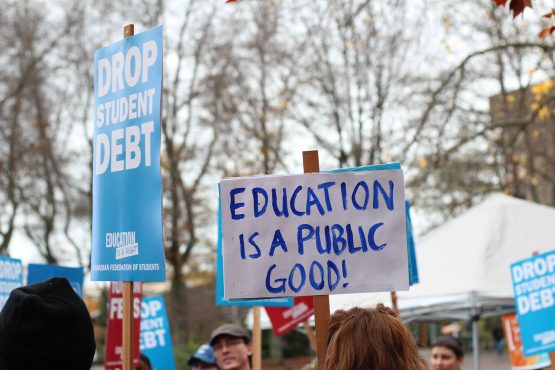This fall, some University of Victoria students are having their tuition paid by the province — the province of Ontario.
This is the inaugural semester of the Ontario Student Grant, an initiative from the Ontario government designed to help with the pressures of post-secondary funding.
Ontario’s provincial government has taken the loans and other grants it provides to low and middle-income students and turned them into grants, starting this fall. Four years of post-secondary tuition are covered for students whose families earn less than $50 000 (or $30 000 for single independents). This means free tuition for Ontario students — even in other provinces. Many of those students are attending the University of Victoria alongside local students who do not get the same deal.
Grants are also being provided to students from middle-income homes. The Ontario Ministry of Advanced Education and Skills Development said that more than half the students whose families earn $83 000 annually are having their tuition paid for as well. Loans are still available for living expenses.
Ontario’s Liberal government estimated that 150 000 students would apply for the free grant, but applications have surged to 210 000. This could mean many students were avoiding going to school because they found education too expensive.
Melanie Mark, B.C. Minister of Advanced Education, Skills and Training, declined to be interviewed. In an email, however, Mark’s office said that British Columbia focuses on “up-front grant funding to groups who are underrepresented in higher education, including students with permanent disabilities, students with dependants, and current or former youth in care.”
In the email, Mark mentioned committing to a $1 000 B.C. Completion Grant for post-secondary graduates, and Mark’s office said “more than 22 000 students (approximately 40 per cent of loan recipients) received some form of loan forgiveness in 2016/17.”
The University of Victoria Students’ Society hoped British Columbia would take the completion grant and “turn it into up-front needs-based grants,” said Anmol Swaich, UVSS Director of Campaigns and Community Relations. Needs-based grants are up-front non-repayable funding for those most in need, and Swaich said the Ontario program, “clearly shows that [this type of funding] is possible.”

A photo from 2016’s Day of Action event at UVic where students rallied in support of lower tuition costs for university students. File photo by Myles Sauer
“Ontario is investing in their own province’s future,” Swaich said. “In B.C., lots of students aren’t able to go to school if they don’t have the funds to enter the university system.”
The Ontario grant is intended to cover the cost of an arts and science degree, around $6 160 per year, but many students receive more to cover textbooks and other expenses.
The University of Victoria’s website estimates a student’s average tuition this year at $6 250.
Mark’s statement also noted that the government has lowered the interest rate on student loans by 2.5 per cent to the prime rate, currently 3.2 per cent, “with the goal of scrapping interest altogether,” though the ministry did not say when.
Mark’s office is aware that Ontario expected no significant cost increase for eliminating tuition for so many students, but refused to give a reason for preferring the system of grants to select groups of people and loans for the rest. The ministry replied to this question saying only, “B.C. is not in a position to interpret another jurisdiction’s policy.”
Andrew Weaver, leader of the B.C. Green Party, said in an email that “the affordability crisis is hitting B.C.’s students especially hard. Tuition fees and cost of living have both been increasing, while wages for youth remain stagnant.”
The Green Party supports needs-based grants, “because university-educated students tend to contribute much more to the economy over time,” Weaver said.
The UVSS has been in contact with Mark’s office and is hopeful the province will include tuition relief in the February budget. “If they don’t we’ll definitely keep pushing,” Swaich told the Martlet. The UVSS is collecting petitions on tuition costs and will be distributing them at the legislature this fall.
Students may think about moving east and getting a more affordable education in Ontario, but they should think again. Under national student loan laws, students are not considered a provincial resident until they have lived there for one year while not attending school.
The author is a recipient of the Ontario Student Grant.







